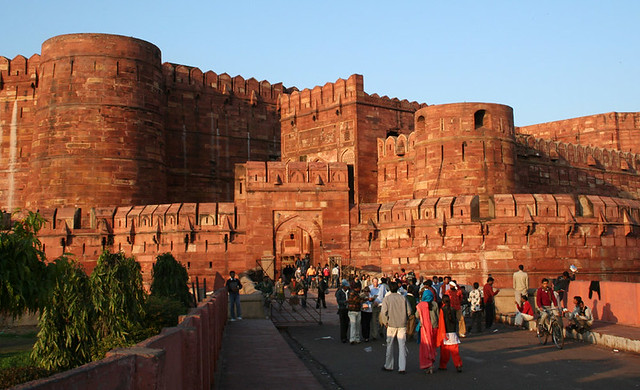As I write this, I'm waiting for our students to return from their weXplore, a five-day excursion that takes students beyond their host city for immersive cultural experiences. For the past two months, we as a school have called Maun, Botswana, our home. It's a small town on the edge of the Okavango Delta and, for many travelers, a doorway into Africa. But Maun is only one perspective, and it...
Read More
It seems that our Hyderabad term is passing more quickly than a speeding auto rickshaw, as our eight-day weXplore excursion to the northern and central regions of India is already upon us. The trip presents an opportunity for our students to visit some of India’s most famous monuments and landmarks while also embedding themselves within the surrounding culture. In doing so, they can engage with the back-stories, critical issues and on-going debates connected with these places.
Focus of the trip
Students will have a chance to witness the pageantry and spectacle of the flag-lowering ceremony held each evening at the Wagah land border post.
Before embarking on the trip our students were provided with an overview of their destinations, which differ in many ways from the southern Andhra Pradesh region in which they have spent the majority of our Hyderabad term. Languages, for example, differ greatly in the south and north. In Hyderabad, where our school is currently based, the locals predominantly speak Telugu and Urdu; on our trip, students will be exposed to the Hindi and Punjabi languages more commonly used in northern India. Other items that were covered in the orientation, with the expectation of being expanded upon during the trip, included:
- A geographical overview of the areas north and south of the Vindhya mountains, and in particular the Punjab region: An emphasis was placed on the fertility of the Punjab region and how it has played a large role in all chapters of Indian history, from ancient times through the assassination of Mahatma Gandhi. Urbanization and its adverse effects on the prehistoric rock caves of Bhimbetka and the deteriorating Yamuna River, which crosses several Indian states, were also examined.
- Social/economic/cultural linkages:
-
The caste system in India — An overview of the caste system was given, so that students are better able to understand Sikhism, which challenged Brahminism and caste hierarchies. This also underlines why the concept of “service” in Sikhism was such a groundbreaking idea.
- The Green Revolution and its implications –- important for better understanding the situation in Punjab.
- India-Pakistan — a brief overview necessary for discussions on the Partition of India and our visit to the Indo-Pak border.
- The Bhopal Gas tragedy
- Critical issues facing tribal communities in India
- A historical overview of the Mughals
- Monuments and living history — should we preserve old buildings and linkages to a past that may have been oppressive? Why? Why not?
Destinations
Over the course of our eight-day journey we will split our time among four cities, all of which boast a population of 1 million or more and offer a variety of manners in which to revisit their dense history. These cities are Amritsar, Agra, Bhopal, and New Dehli. In New Dehli, a particular focus will be placed on giving the students a sense of the continuity of the city through the ages, leading up to a discussion on urban heritage and preserving living monuments. As mentioned above, the issue of urbanization and its effects on the Yamuna river will also be taken up.
Our planned itinerary:

The Golden Temple (Amritsar, India)
Amritsar
- The Golden Temple
- Jallianwala Bagh gardens
- Wagah Border for the flag-lowering ceremony
- Gatka (a Sikh martial art) demonstration
- An optional visit to the old city

The Agra Fort (Agra, India)

Sanchi (Bhopal, India)
Bhopal
- Sanchi: Home to the oldest Buddhist stupas in the world, and supposedly Buddha’s resting place
- Prehistoric rock art on the caves of Bhimbetka
- Museum of Tribal Culture
- Union Carbide factory and Sambhavna Clinic
New Delhi
- Qutab Minar
- Humayun’s Tomb
- Purana Qila
- Jama Masjid
- Raj Ghat (Ghandhi’s Memorial)
- A guided walk through the Old City to look at some of the dying professions in this quarter
- An evening visit to a Sufi Shrine
- Crafts bazaar at Dilli Haat
- A session on partition, nationalism and non-violence with Dr. Dilip Simeon
We look forward to sharing with you our students’ stories and media from the road in the near future!